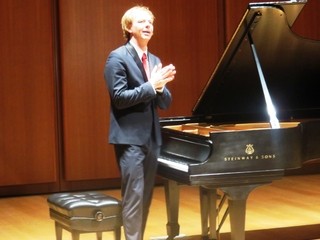|
Back
Power Player New York
The Morgan Library and Museum
03/16/2017 -
“Three Centuries of Swedish Music” (presented by The American/Scandinavian Foundation/Scandinavia House)
Franz Berwald: Fantasy on two Swedish folk melodies
Johannes Brahms: Three Intermezzi, Opus 117
Wilhelm Stenhammar: Fantasy in B minor, Opus 11
Albert Schnelzer: Dance with the Devil
Franz Liszt: Années de pèlerinage (Deuxième année. Italie): “Après une lecture du Dante (Fantasia quasi sonata)”
Per Tengstrand (Pianist)

P. Tengstrand at Morgan Library (© Samuel T. Dog)
The image of Thor sitting down at the piano after a day of pillaging, ransacking and thunder-things is not quite conceivable. But Per Tengstrand, the young Swedish pianist currently giving concerts and lectures in New York, certainly gave that impression at Morgan Library.
(Which appropriately enough, was Thors-day evening)
I attended to hear music from two Swedish composers whose orchestral music is so impressive. And indeed, the symphonies, concertos and Serenade by Wilhelm Stenhammar are among my favorites, while Franz Berwald’s symphonies are deliciously quirky.
Far more impressive than the piano music played by Mr. Tengstand. Or perhaps it was that the young artist is so powerful, offers such a Viking-like touch to all his music, that one might not be able to glance the soul beneath the notes.
Mind you, he is not an exhibitionist. The thunder, lightning and amazing octave runs from his fingers seem the most natural things in the world. He may jump up and down from his piano-stool, but the powerful effects are effortless. And after the most awesome playing, he rises up without a hair out of place, without a scintilla of exertion.
During the first work, this seemed impressive but not quite in place. I had heard Berwald’s Fantasy on Two Swedish Folk Melodies before, and each time the work is, if not gentle, sensitive, delicious, and yes, difficult. Mr. Tengstrand launched into the work like a champion tennis-player, continuing the Fantasy in the mode of the usual mid-19th Century show-pieces by Alkan or the worst work by Liszt.
The folk melodies were recognizable by many in the audience (celebrating the Morgan Library’s Swedish exhibitions this month), but they were far from the regal and then naive tunes by the composer. Mr. Tengstrand turned the slight introduction into a work of dashing brilliance, and the following melodies into Chopinesque etudes.
It was mightily impressive, but I’m uncertain if it was Berwald.
The following Brahms Intermezzi were preceded by a short talk by the pianist about fantasies in general. He is a most genial speaker, and I heard that his series about Beethoven sonatas at the Swedish Institute is most enlightening. As was the Brahms works. They did have that improvisational feel, they were played with sympathy, no idiosyncrasies, the “lullaby” flavor which the composer suggested.
Stenhammar’s own Fantasy was new to me, and one couldn’t fault the molto appassionato direction. Unlike the Berwald, the fireworks were all in place. Yes, this was like late Brahms, it lacked the originality of Stenhammar’s own late pieces, but was a stunning performance.
Dance with the Devil by the young Swedish composer Albert Schnelzer was a combination (says a note on the score) of Lisztian Danse macabre with Heavy Metal. It was actually a kind of rondo, tied together with forte fortissimo trills and chords on the lowest end of the piano, with macabre tunes at the top and middle, with a few accented syncopations giving the “dance” motives. And was made for Mr. Tengstrand’s digital prowess.
The final work was by far the most memorable work played in the recital. Possibly because Liszt’s fantasy After a Lecture by Dante is one of Liszt’s most difficult, ambitious and, yes, romantic works. Mr. Tengstrand couldn’t wait to get into the nuts and bolts of the piece, with the pain and cries of the Inferno, but with equal regard for the great yearning middle section.
An encore of Grieg’s March of the Dwarfs was not quite appropriate. Mr. Tengstrand has a gigantic power. One looks forward to a recital of Liszt or even Beethoven. The outcome could be an effect more powerful musically than his digitally powerful choices last night.
Harry Rolnick
|